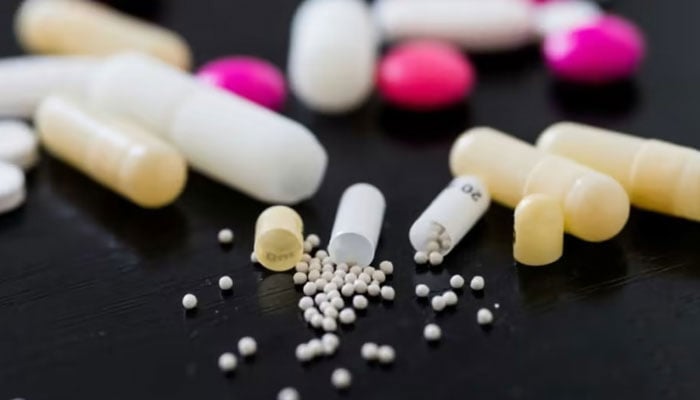Meds for the people
As economy suffered, private companies removed perks and other benefits
Over the last few weeks, all we have been watching on the news is how well economic indicators have performed throughout the year. While this does call for celebrations, there is also an urgent need to understand how the economic turnaround has affected ordinary Pakistanis. A few days back, a report by the IQVIA, a leading global provider of advanced analytics, technology solutions and clinical research services to the life sciences industry, highlighted growth in Pakistan’s pharmaceutical sector. The industry grew by an impressive 21.79 per cent in the third quarter of 2024 compared to the same period last year, reaching a market value of Rs962.5 billion, the monitoring firm said. This was largely driven by a deregulatory policy announced by the Anwaarul Haq Kakar-led caretaker government in 2023, allowing pharmaceutical companies to independently raise prices for non-essential drugs excluded from the National Essential Medicines List (NEML). But this has led to a drop in sales. Experts say that the sector’s growth is largely fuelled by price adjustments the companies were allowed to make instead of an increase in sales volume. What is even worse is the fact that this price increase has affected people’s ability to buy medicines.
Medicines have long enjoyed inelastic demand, with price adjustments not affecting sales. But perhaps those responsible for this classification were not aware to what extent a pandemic, an unexpected war and domestic political instability could affect a developing country’s economic conditions. We have reached a point where, according to pharmacy owners, people are cutting down on their medicines to meet their budgets. For years, inflationary pressures were less pronounced mostly because many people rely on charities and other welfare organisations to get medicines either for free or at discounted rates. Then, most private institutions also provided medical facilities to their employees. As the economy suffered, private companies removed perks and other benefits. According to several doctors, some medicines have seen a 100 per cent price hike; one brand of antispasmodic medicine has gone up by 218 per cent, while other medicines have also witnessed a significant increase in their prices. Nutritional supplements, essential for the elderly, have also become quite expensive. People should not be brought to a point where they have to ration their medicines or beg doctors to tweak their prescriptions according to their budget.
The government has to come up with a way where both businesses and people are satisfied. People’s purchasing power will increase if they have enough job opportunities to increase their income. Since the Covid-19 pandemic, the country has been in the grip of an economic crunch. The gig economy that thrived pre-Covid is also fading away. The spark and optimism needed for a country’s growth is deeply missing. If the government does not act today, it will be too late.
-
 'Bridgerton' Season 4: Showrunner Talks About Violet's Steamy Romance
'Bridgerton' Season 4: Showrunner Talks About Violet's Steamy Romance -
 John Tesh Recalls ‘uncomfortable’ Backlash Over ’70s Romance With Oprah Winfrey
John Tesh Recalls ‘uncomfortable’ Backlash Over ’70s Romance With Oprah Winfrey -
 Meghan Markle, Prince Harry Problem Was Not ‘work’ During Time With Royals
Meghan Markle, Prince Harry Problem Was Not ‘work’ During Time With Royals -
 Meta Strikes Multi-billion-dollar AI Chip Deal With Google: Will The New Collaboration Pay Off?
Meta Strikes Multi-billion-dollar AI Chip Deal With Google: Will The New Collaboration Pay Off? -
 Gracie Abrams Breaks Silence After Losing 2026 BRIT Award
Gracie Abrams Breaks Silence After Losing 2026 BRIT Award -
 Deon Cole Takes Swipe At Nicki Minaj In Mock Prayer During NAACP Image Awards Monologue
Deon Cole Takes Swipe At Nicki Minaj In Mock Prayer During NAACP Image Awards Monologue -
 Jennifer Garner Reveals The Actress Who 'carried Through Things'
Jennifer Garner Reveals The Actress Who 'carried Through Things' -
 Shamed Andrew ‘awful’ Time As Trade Envoy Is Laid Bare By Insider
Shamed Andrew ‘awful’ Time As Trade Envoy Is Laid Bare By Insider -
 Belgium Seizes Suspected Russian Shadow Fleet Tanker
Belgium Seizes Suspected Russian Shadow Fleet Tanker -
 Liza Minelli Makes Bombshell Claim About Late Mother Judy Garland’s Struggle With Drugs
Liza Minelli Makes Bombshell Claim About Late Mother Judy Garland’s Struggle With Drugs -
 Shipping Giant Maersk Halts Suez Canal, Bab El-Mandeb Sailings Amid Escalating Conflict
Shipping Giant Maersk Halts Suez Canal, Bab El-Mandeb Sailings Amid Escalating Conflict -
 Matthew McCoughaney Reveals One 'gift' He Achieved With Losing Nearly 50 Pounds
Matthew McCoughaney Reveals One 'gift' He Achieved With Losing Nearly 50 Pounds -
 'Scream 7' Breaks Box Office Record Of Slasher Franchise: 'We Are Grateful'
'Scream 7' Breaks Box Office Record Of Slasher Franchise: 'We Are Grateful' -
 Bolivian Military Plane Crash Death Toll Rises To 20
Bolivian Military Plane Crash Death Toll Rises To 20 -
 'Sinners' Star Blasts Major Media Company For 2026 BAFTAs Incident
'Sinners' Star Blasts Major Media Company For 2026 BAFTAs Incident -
 Inside Scooter Braun, Sydney Sweeney's Plans To Settle Down, Have A Baby
Inside Scooter Braun, Sydney Sweeney's Plans To Settle Down, Have A Baby




